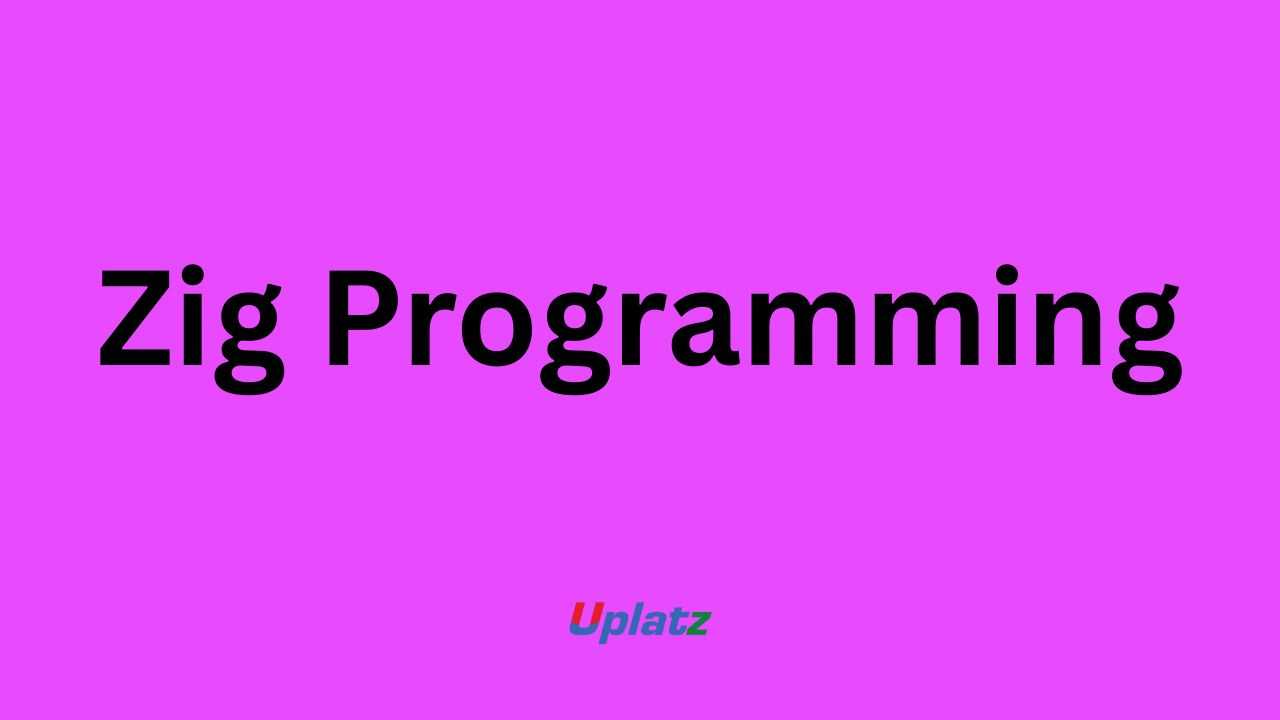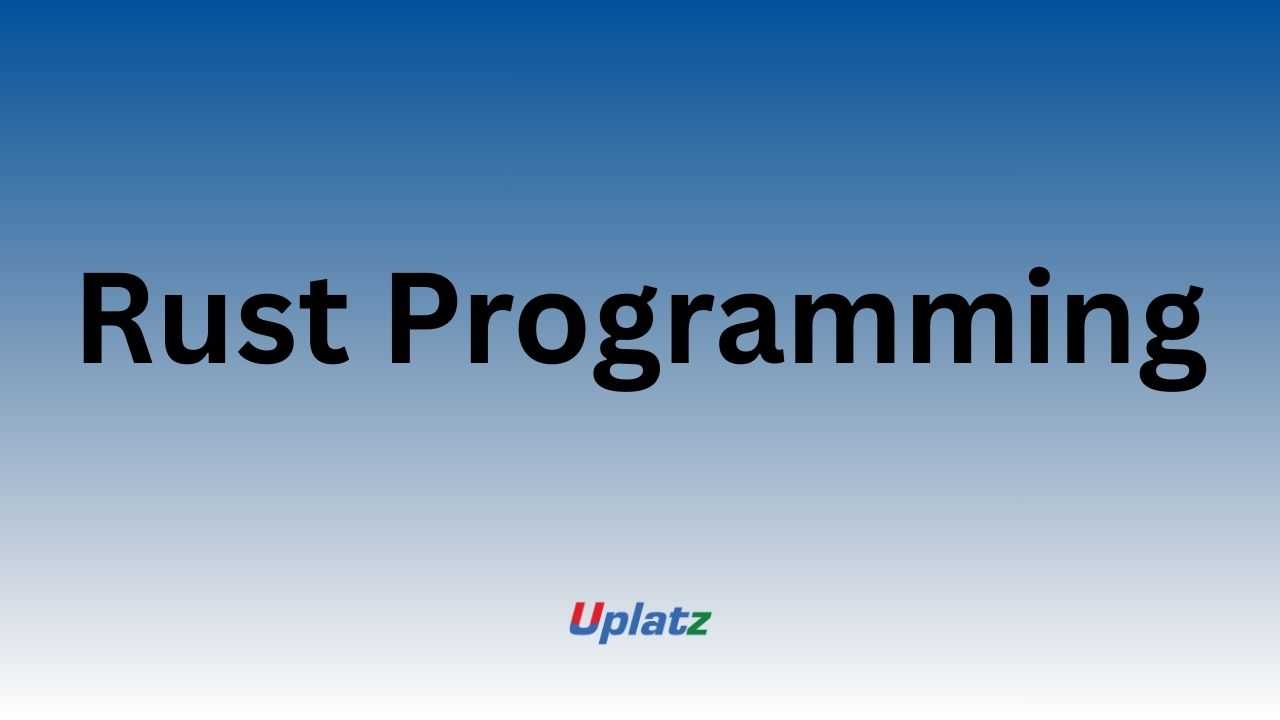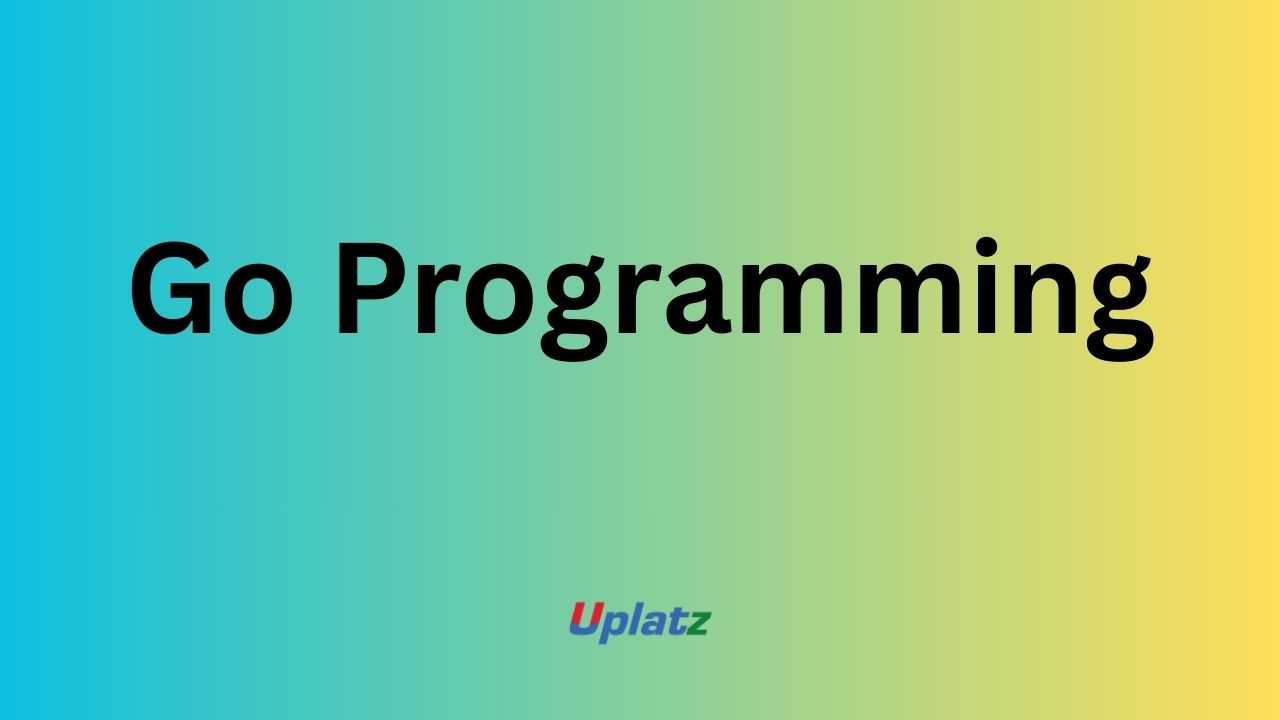Zig Programming
Master Zig programming to build safe, fast, and low-level applications with modern systems programming features. Price Match Guarantee
Full Lifetime Access
Access on any Device
Technical Support
Secure Checkout
Course Completion Certificate
Price Match Guarantee
Full Lifetime Access
Access on any Device
Technical Support
Secure Checkout
Course Completion Certificate
 96% Started a new career
BUY THIS COURSE (
96% Started a new career
BUY THIS COURSE (GBP 12 GBP 29 )-
 86% Got a pay increase and promotion
86% Got a pay increase and promotion
Students also bought -
-

- C and Embedded C Programming
- 10 Hours
- GBP 12
- 157 Learners
-

- Rust Programming
- 10 Hours
- GBP 12
- 10 Learners
-

- Go Programming
- 10 Hours
- GBP 12
- 10 Learners

Zig is a powerful, modern systems programming language designed to be a clean, safe, and efficient alternative to C. It offers manual memory management, predictable performance, and precise control over hardware, all while avoiding the complexity of C++. Zig’s philosophy revolves around simplicity, transparency, and developer empowerment — letting programmers write fast, reliable software that performs consistently across platforms.
This Mastering Zig – Self-Paced Online Course by Uplatz introduces you to the fundamentals of Zig, its build system, compiler, and memory management model. Through detailed lessons and hands-on projects, you’ll learn how to develop performant, low-level applications, build cross-platform binaries, and integrate Zig into your existing C ecosystem.
Whether you’re a seasoned C developer exploring new tools or a systems engineer aiming to modernize your development workflow, this course provides a clear, structured path to mastering Zig’s core concepts and best practices.
🔍 What is Zig?
Zig is an open-source, statically typed programming language created for systems-level programming, much like C, but designed to fix many of its pitfalls. It eliminates undefined behavior, introduces a powerful build system, and encourages explicit memory handling instead of garbage collection or hidden runtime abstractions.
Key design principles include:
-
Simplicity: No hidden control flow or implicit allocations.
-
Safety: Compile-time and runtime checks prevent common bugs.
-
Performance: Predictable optimizations and direct hardware access.
-
Cross-Compilation: Built-in support to target any platform from any host.
-
C Integration: Interoperate directly with existing C libraries and headers.
Zig empowers developers to create software that’s as fast as C, but with modern safety guarantees, cleaner syntax, and a much better developer experience.
⚙️ How Zig Works
At its core, Zig compiles directly to native machine code using LLVM, allowing developers to build software for any architecture or operating system. Its build system is written in Zig itself — offering full programmability and automation in dependency management, compilation, and testing.
Zig applications are built with manual memory management via allocators, giving developers explicit control over allocation and deallocation patterns. Unlike high-level languages that hide memory operations, Zig makes every resource interaction visible, leading to more efficient and predictable software.
Another standout feature is error handling — Zig replaces exceptions with compile-time checked error unions (!Type) that make error propagation explicit and type-safe. Combined with defer statements, developers can manage cleanup and resource release elegantly without losing control of program flow.
Zig also supports cross-compilation out of the box, meaning you can build binaries for multiple target platforms without additional setup — a huge advantage for embedded developers, game engine creators, and system software engineers.
🏭 How Zig is Used in the Industry
Zig is rapidly being adopted across industries where performance, reliability, and portability matter most. Its predictable memory model and low-level control make it ideal for:
-
Systems Programming: OS components, device drivers, and runtime environments.
-
Embedded Development: Efficient firmware and microcontroller software.
-
Game Engines & Graphics: Real-time rendering and high-performance simulations.
-
Compiler & Toolchain Development: Custom build systems and interpreters.
-
Cross-Platform Applications: Tools and CLIs that need minimal dependencies.
-
Security & Cryptography: Building lightweight, auditable codebases with manual control.
Major open-source communities are exploring Zig as a replacement for C in performance-critical projects. Companies focused on game technology, hardware control, or runtime infrastructure increasingly consider Zig for its predictability, speed, and ease of integration with C-based ecosystems.
🌟 Benefits of Learning Zig
Learning Zig empowers developers to understand computing at a deeper level while writing maintainable and efficient code. Some of the key benefits include:
-
Performance Without Complexity: Achieve C-level speed with cleaner syntax and safer semantics.
-
Complete Control: Manage memory and hardware directly without runtime overhead.
-
Cross-Compilation Made Simple: Build applications for multiple platforms with a single command.
-
Seamless C Interoperability: Import and use C libraries natively — no bindings needed.
-
Error Safety: Eliminate crashes and silent failures through Zig’s type-safe error handling.
-
Portable Toolchain: Write once, compile anywhere — perfect for embedded and mobile targets.
-
Future-Proof Skills: Zig’s growing community and industry relevance make it a language worth mastering for the next decade.
By learning Zig, you’re not just adding another language to your résumé — you’re learning how computers actually work, developing the mindset and precision of a true systems engineer.
📘 What You’ll Learn in This Course
This self-paced course is designed to take you from beginner to proficient Zig developer through structured lessons and applied projects. You’ll learn to:
-
Understand Zig’s syntax, tooling, and compiler pipeline.
-
Write efficient systems programs using manual memory management.
-
Use allocators to control allocation strategies and resource lifecycles.
-
Build and test cross-platform applications with Zig’s native build system.
-
Interoperate seamlessly with C libraries and APIs.
-
Explore concurrency, error handling, and I/O operations in Zig.
-
Optimize performance and compile binaries for multiple platforms.
-
Deploy Zig programs for systems software, embedded devices, and high-performance applications.
Every module includes hands-on coding tasks, real-world examples, and mini-projects that reinforce practical skills and confidence.
🧠 How to Use This Course Effectively
To get the best learning experience:
-
Set Up Your Environment: Install the Zig compiler and explore its command-line interface.
-
Learn by Coding: Practice syntax and features daily — repetition builds mastery.
-
Focus on Memory Control: Write small utilities to experiment with allocators and pointers.
-
Integrate with C Libraries: Use Zig’s direct C interop for real-world projects.
-
Tackle Concurrency Early: Understand async/await and cooperative multitasking.
-
Build Mini-Projects: Create CLI tools, simple servers, or embedded utilities.
-
Experiment Across Platforms: Compile for Linux, macOS, Windows, and microcontrollers.
-
Review & Refactor: Revisit projects to improve design, safety, and performance.
👩💻 Who Should Take This Course
This course is designed for:
-
C/C++ Developers looking for a cleaner, modern systems language.
-
Systems Programmers building OS-level or embedded software.
-
Game Developers optimizing for performance and resource efficiency.
-
Embedded & IoT Engineers targeting constrained environments.
-
Students & Enthusiasts eager to learn programming close to the hardware.
Whether you’re a professional developer upgrading your low-level skills or a learner fascinated by systems programming, Zig will give you a deep, practical understanding of modern computing foundations.
🧩 Course Format and Certification
The course is self-paced and includes:
-
HD video tutorials and step-by-step coding walkthroughs.
-
Downloadable project files and sample code.
-
Practical assignments with real-world scenarios.
-
Quizzes and knowledge checkpoints to reinforce learning.
-
Lifetime access to course content and future updates.
Upon successful completion, you’ll earn a Uplatz Course Completion Certificate, verifying your mastery of Zig and enhancing your portfolio for systems or embedded programming roles.
🚀 Why This Course Stands Out
-
Comprehensive Coverage: From syntax to system deployment.
-
Hands-On Learning: Build real projects, not just examples.
-
Career-Oriented: Learn one of the most promising C alternatives.
-
Flexible & Self-Paced: Study anytime, anywhere, at your own speed.
-
Future-Ready: Master skills that bridge software and hardware development.
This course doesn’t just teach Zig — it helps you think like a systems programmer, giving you the precision and confidence to write efficient, portable, and high-performance code.
🌐 Final Takeaway
As the demand for efficient, low-level software continues to grow across industries, Zig is redefining the landscape of systems programming. It delivers the speed of C, the control of assembly, and the safety of modern design — all in one elegant language.
The Mastering Zig – Self-Paced Online Course by Uplatz equips you with a solid understanding of the language, its ecosystem, and its practical applications in real-world scenarios. Whether you’re writing embedded code, building compilers, or optimizing performance-critical systems, Zig will give you the edge to code smarter, faster, and safer.
Start learning today and become part of the new wave of systems developers shaping the future of high-performance computing.
By completing this course, learners will:
-
Write efficient Zig programs with safe memory control.
-
Use Zig’s build system and package manager.
-
Handle errors and concurrency effectively.
-
Interact with C code and libraries directly.
-
Build cross-platform and embedded projects.
-
Apply Zig in real-world performance-critical applications.
Course Syllabus
Module 1: Introduction to Zig
-
Why Zig? Philosophy and use cases
-
Installing Zig and using the compiler
-
First Zig program
Module 2: Language Basics
-
Variables, constants, and types
-
Functions and scopes
-
Control flow structures
Module 3: Data Structures
-
Arrays and slices
-
Structs and enums
-
Optionals and unions
Module 4: Memory Management
-
Manual memory allocation with allocators
-
Heap vs stack memory
-
Safe resource cleanup
Module 5: Error Handling
-
Error unions and
try/catch -
Defer and error propagation
-
Common error-handling patterns
Module 6: Concurrency & Performance
-
Async functions in Zig
-
Low-level concurrency primitives
-
Performance optimization techniques
Module 7: Build System & Packages
-
Using Zig’s build system
-
Package management basics
-
Cross-compilation
Module 8: C Interoperability
-
Importing C libraries
-
Using
@cImportfor bindings -
Migrating C projects to Zig
Module 9: Real-World Projects
-
CLI tool with Zig
-
Game engine module example
-
Embedded system demo
Module 10: Best Practices & Advanced Topics
-
Debugging Zig programs
-
Project structuring for maintainability
-
Future of Zig and community ecosystem
Upon completion, learners receive a Certificate of Completion from Uplatz, validating their expertise in Zig systems programming. This certification demonstrates readiness for roles in systems engineering, embedded development, and performance-critical software design.
Zig expertise prepares learners for roles such as:
-
Systems Programmer
-
Embedded Software Engineer
-
Game Developer (low-level engines/tools)
-
Performance Engineer
-
Compiler/Language Developer
Zig is increasingly being used in embedded systems, high-performance computing, and modern systems programming, making it a future-oriented skill.
-
What is Zig and why was it created?
Zig is a systems programming language created as a modern alternative to C, focusing on simplicity, performance, and predictability. -
How does Zig differ from C?
Zig provides manual memory control like C but with safer error handling, better cross-compilation, and modern tooling. -
What are allocators in Zig?
Allocators are abstractions for memory management, allowing developers to control how and where memory is allocated. -
How does Zig handle errors?
Through error unions,try, andcatch, ensuring explicit and predictable error handling. -
What is cross-compilation in Zig?
Zig has built-in cross-compilation support, allowing developers to compile binaries for different platforms without extra tools. -
How does Zig interoperate with C?
Zig can directly import C headers using@cImportand call C functions without foreign function overhead. -
What are some real-world use cases of Zig?
Game engines, operating systems, embedded systems, performance-critical libraries, and developer tooling. -
How does Zig manage concurrency?
Zig supports async/await and concurrency primitives for lightweight concurrency. -
Why is Zig gaining popularity?
Because of its focus on safety, cross-compilation, and replacing C in modern software ecosystems. -
What are the advantages of Zig over Rust?
-
Zig: simpler, more predictable, manual memory control.
-
Rust: borrow checker, memory safety guarantees.
Zig appeals to developers who prefer manual control over compiler-enforced safety.









